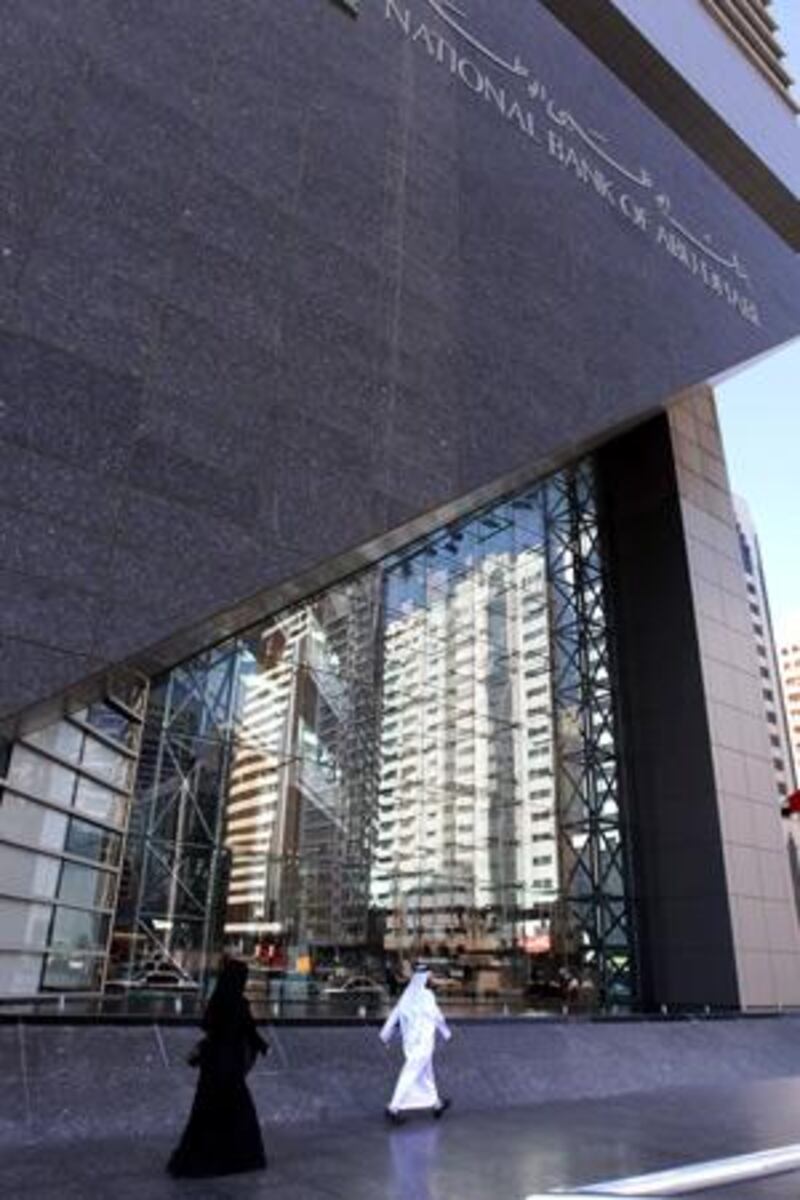Fourth-quarter profit for National Bank of Abu Dhabi fell 13 per cent from the same period a year earlier as the emirate's biggest lender by assets made large voluntary provisions. Fourth-quarter profit declined to Dh429 million (US$116.79m) while the bank's full-year earnings came in largely flat at Dh3.02 billion. The results missed analysts' expectations.
"We have tripled our collective provisions in the past year-and-a-half, and that has cost us a lot of profit," said Michael Tomalin, the chief executive. Unlike provisions for bad loans, collective provisions are not taken against specific non-performing loans, or loans likely to go bad. They reflect the bank's cautious outlook for the year ahead. Last year, the bank set aside Dh1.6bn in collective provisions, Dh316m of that in the last quarter.
"This is not to say that we think we will have a catastrophic amount of bad loans this year," Mr Tomalin said. "All we are doing is putting ourselves in a comfortable position." Banks have been allocating increasing amounts of cash to cover potential losses emanating from non-performing loans since years of rapid expansion came to an end in late 2008. "If 2010 proves to be a year of recovery, then clearly these provisions are excessive. If they are just at the right level, then they will be used, and if they are not enough, then we have built a good cushion," Mr Tomalin said.
NBAD now has a cover ratio of 158 per cent for its non-performing loans. "That is a high number, especially as we knew they did not have any large problems," said Germaine Benyamin, an associate at HC Securities and Investment. "The question is, what are they expecting? And that could have large implications for the sector." However, Mr Tomalin said that this year would be "challenging" and "banks will not be able to grow their balance sheets at a high speed".
He said he expected the number of non-performing loans to rise through the year. Until recently, the bank had expected the number of loans on which customers defaulted to peak by the second quarter of this year. The bulk of NBAD's loans are extended to corporations, with about 10 per cent to individuals. At present, NBAD's non-performing loan ratio stands at 1.25 per cent, which is far below the average of about 3 per cent at UAE banks. The value of its non-performing loans increased by Dh600m from 2008 to last year.
The bank decided to raise its collective provisions to 1.25 per cent of its credit-risk-weighted assets 18 months ago. That is the limit allowed under Basel II regulations by the Bank for International Settlements. So far, the Central Bank does not require banks to make a fixed amount of collective provisions, but it has started to discuss the issue. As with its peers, provisions have eaten into NBAD's bottom line. In the past year, banks in the region have been dealt a series of blows, including some large corporate failures, which are now showing in weak annual earnings.
Many local banks also lent heavily to the troubled Saudi conglomerates Saad Group and Ahmad Hamad Al Gosaibi and Brothers, which started to default in May. Many also have exposure to Dubai World, the heavily indebted conglomerate. NBAD, however, has only about $7.5m in exposure to the Saudi conglomerates, while its exposure to the Dubai World Group now stands at $239m, Mr Tomalin said. The bank chairman, Nasser Ahmed Khalifa Alsowaidi, was also upbeat. "I am pleased with NBAD's profits, which were achieved in extremely difficult local and international operating conditions."
NBAD stock closed 1.8 per cent higher yesterday at Dh11.40. @Email:uharnischfeger@thenational.ae





